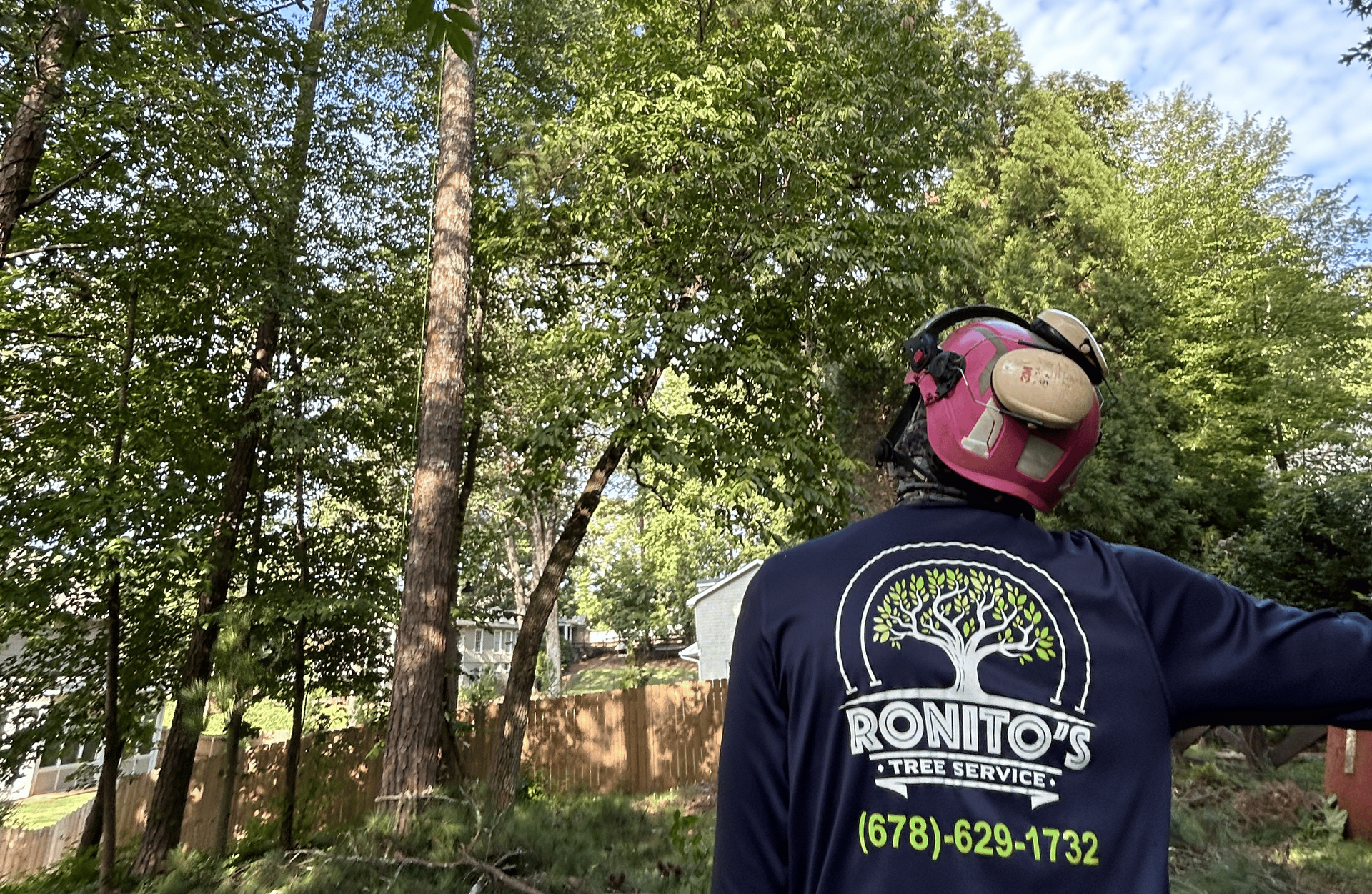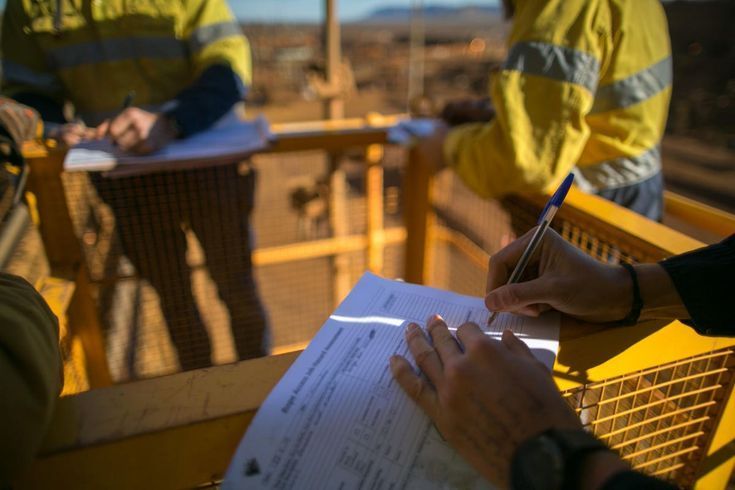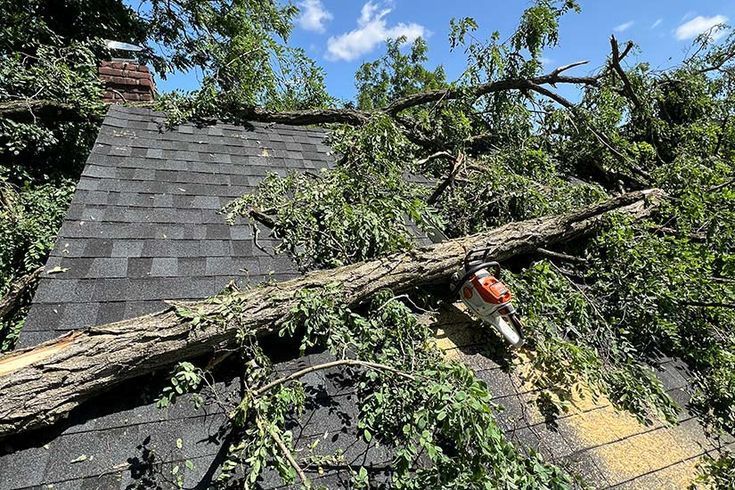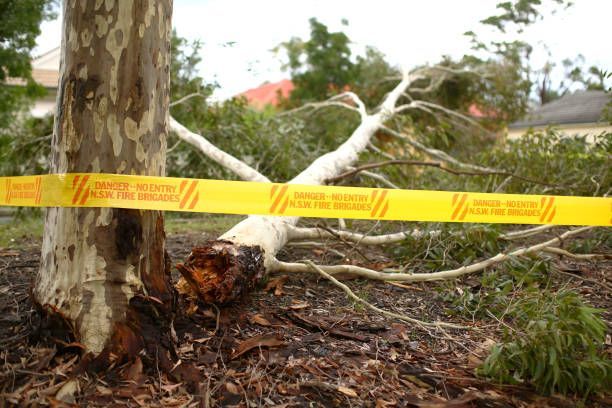5 Signs Your Marietta Tree Has to Go
(and How to Have It Removed Safely)

1. Large Dead Branches (“Widow-makers”)
What it looks like
- Bare, brittle limbs high in the canopy, especially in water oak, sweetgum, and loblolly pine.
- Bark peeling off in wide strips.
- Woodpecker holes clustered on an otherwise leafless branch.
Why it matters
Marietta averages 50-plus thunderstorm days per year. A heavy gust can snap a dead limb and send it crashing onto a roof, parked car, or a neighbor’s fence. Even a smaller branch can become a dangerous projectile during winter ice.
What to do
Deadwood
pruning can save an otherwise healthy tree, but if more than 30 percent of the crown is dead, removal is likely the safer bet. Have a certified arborist inspect the overall structure before you make a decision.
2. Major Trunk Cavities or Cracks
What it looks like
- A hollow that you can fit your fist into, often at the base of a mature white oak or tulip poplar.
- Vertical cracks that run the length of the trunk.
- Mushrooms or conks (shelf fungi) sprouting around the wound.
Why it matters
Cavities reduce a tree’s load-bearing strength. Fungal fruiting bodies are a sign that internal decay is already underway. If the tree leans toward your house or a play area, that compromised trunk becomes a liability.
What to do
A resistograph or sonic tomography test (both offered by ISA-certified arborists) measures the amount of solid wood remaining. If less than one-third of the diameter is sound, removal is recommended.
3. Sudden Lean After a Storm
What it looks like
- The root plate lifts on one side, creating a small mound.
- Soil cracks appear opposite the lean.
- Fine feeder roots are exposed.
Why it matters
Georgia’s clay soils hold water like a sponge after heavy rain. Tall pines, common in East Cobb subdivisions, can uproot without warning when heavy winds come after rain. Once a tree’s center of gravity shifts, it rarely rights itself and can fall with the next storm.
What to do
Do not attempt to straighten the tree with ropes or winches; this can shear already stressed roots. Call an arborist for an emergency assessment. Leaning more than 15 degrees from vertical usually warrants removal.
4. Significant Pest Infestation
What it looks like
- Ambrosia beetle: toothpick-like sawdust strings on red maple trunks in spring.
- Pine beetle: popcorn-sized pitch tubes on loblolly or shortleaf pine.
- Emerald ash borer: D-shaped exit holes on green or white ash.
Why it matters
Boring insects cut off the flow of water and nutrients. Trees weakened by drought or compacted soil, both common along busy Marietta corridors like Roswell Road, are prime targets. Left unchecked, an infestation can spread to neighboring trees and wipe out an entire stand.
What to do
Early detection treatments are possible, but if galleries encircle more than 50 percent of the trunk, removal stops further spread and saves treatment costs on potentially every tree in your yard.
5. Root Damage or Soil Compaction
What it looks like
- Construction trenching within the drip line.
- Sidewalk heaving or freshly poured driveway edges cut through primary roots.
- Sparse foliage and stunted new growth.
Why it matters
More than 80 percent of a tree’s roots never reach past the top 18 inches of soil. When those upper roots are severed or the soil is compacted by heavy machinery, the tree loses its anchor and its ability to draw water, often leading to a slow but inevitable decline.
What to do
An ISA-certified arborist can perform an air-spade root inspection to assess the extent of the damage. In many cases, you can’t undo the injury, and removal becomes the most cost-effective solution before the tree begins to shed limbs.
Why Choose an ISA Certified Arborist?
- Expert Diagnosis: Certified professionals undergo rigorous and continuous testing on tree biology, risk assessment, and safety requirements and practices.
- Proper Equipment: From crane removals over Gwinnett-style tight backyards to low-impact track loaders that preserve your lawn, certified crews bring the right gear.
- Liability Coverage: Ronito’s carries full insurance, protecting your home and your wallet.
- Local Knowledge: We are familiar with Marietta’s tree ordinances and can obtain the necessary permits to ensure compliance.
Safety Risks of DIY Removal
- Electrical Hazards: Around 30 percent of tree-related injuries involve accidental contact with power lines.
- Improper Notching: A poorly executed felling cut can easily cause a 5-ton water oak to fall backward onto the cutter.
- Equipment Failure: Consumer-grade chainsaws and ladders are not designed to withstand the forces involved in large tree removals.
- Legal Liability: Damage to a neighbor’s property is your responsibility if you skip professional help.
Call Ronito’s Tree Service for a Free On-Site Quote
If any of these warning signs sound familiar, let’s talk. Our ISA-certified arborists provide honest, no-pressure assessments anywhere in Marietta, from historic downtown to new builds off Barrett Parkway. We can often be at your property the same week.
Reach us today at (678) 629-1732 or request a visit through our online form. We will evaluate your tree, outline all options, and give you a precise, written estimate. No hidden fees, no scare tactics.
Keep Your Home Safe and Your Landscape Beautiful
Proactive tree care protects your family, your property value, and Marietta’s leafy charm. Whether your tree needs a simple prune or a complete removal, Ronito’s Tree Service is ready to help.
Recent Posts








